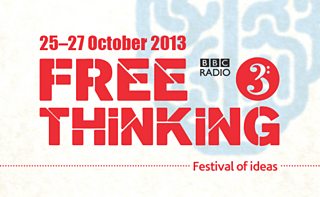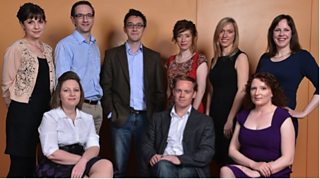Free Thinking Festival of Ideas 2013: Who's in control?
Matthew Dodd
Head of Speech Programming, Radio 3

The is Radio 3's annual festival of ideas, and this year - its 8th – it takes place from Friday 25th to Sunday 27th of October at . The weekend is packed full of debates, lectures, performance, discussion and conversation, staged in front of a live audience, covering a wide range of topics. The events are either all broadcast live or recorded for later transmission on Radio 3 during the weekend or in the subsequent three weeks in our evening speech slots, usually inhabited by Night Waves.
Free Thinking is a chance for the public to hear and interact with interesting leading thinkers, for us to cover a range of topics and to give new audiences both in Gateshead and those listening in for the first time, a sense of what Radio 3's speech and music agenda is.
Radio 3 is a music and arts station, so the theme of Arts and Ideas (the overarching idea behind Free Thinking is something that is very important to our cultural coverage. And what makes Free Thinking distinctive is the way it can all be held together in a debate format and feature leading figures from science, art, politics and public life in general tackling some of the leading questions of our time.
Each year the festival has a theme, loosely connecting the wide range of topics together which we hope will be subjects that are pre-occupying people at the time of the weekend. This year the theme is ‘Who's In Control?’
The Festival isn’t a conference where we set an agenda and then find speakers for it. Instead, in putting the Festival together we approach a variety of potential speakers and invite them to consider the different ways they want to develop that theme. For some events like panel discussions for example, we’ll invite a range of experts who present different views to offer a balanced debate too.�� Of course, there will be lots of discussions in the production team about who we need, but often one of the most satisfying things about Free Thinking is when audience members attending the events take a chance on something they see in the programme, and go and see something about which they only know a little bit, often featuring experts who are unfamiliar to them. It is often those events which members of the audience come out from thinking that was a fantastic event.
I am looking forward to seeing the all the speakers this year, but highlights for me include the opening lecture, given by Sir Michael Marmot on health and life expectancy and what control means to our health. Lionel Shriver, who's got very sharp observations about contemporary society, will be in attendance, and Professor of Education at Newcastle University Sugata Mitra , who this year has been selected by as one of their prize-winners for his talks,who is doing some fascinating work in India with computers and education, and whose work is making real waves at the moment.
In addition to the full range of speakers, debaters and thinkers you can see in the , Radio 3’s also form part of the weekend’s schedule of events. This year’s NGTs are ten academics chosen through a competitive process. We ask academics who work in the area of the to send an application to us pitching an idea they have for a programme related to their research. Through a series of workshops which we run, we select the final ten people and they work with across the year. The successful applicants come to the festival and deliver an essay which then gets broadcast in our essay slot on Radio 3. The topics - led by the New Generation Thinkers - are either the main area of their research, or an aspect of it.��

New Generation thinkers 2013
The New Generation Thinkers’ contributions won’t necessarily follow the ‘Who’s in Control?’ theme of the festival. Even so, Free Thinking is one of the Thinkers moments to shine. Of course, they will have done lots of lecturing, but that might be to fellow academics and specialists. That same live audience element they benefit from is also essential to the festival. Radio 3 doesn’t usually have a live audience for its speech programmes. From a production perspective, there's no doubt that we’re always thinking of the listening audience when we’re broadcasting, but to have the audience physically next you is a very different experience. In the past I have seen producers really have to think about the way in which they make programmes because they've got an audience responding instantly; laughing, clapping etc. What’s great is that people say different things at audience events like Free Thinking. They respond differently, and as a result, our speakers respond differently. Speakers may be more accommodating, or they may be more antagonistic, depending how they respond to the audience and as a result a different sort of programme can sometimes result.
With that that in mind, we have learnt from previous years how dependent we are on the professionalism of our presenters. To chair a debate with several people might seem like the easiest thing in the world, but to do it succinctly in an hour, to ensure that each speaker has been given a fair opportunity to talk, that they've been questioned enough and that the audience have also had a chance to take part in the discussion is very difficult. The presenters have to have in their head the idea that the programme they’re presenting or chairing isn’t just for the people present, but also the people who will be listening to the radio broadcast in a week or so, or those who will be downloading it in one year's time. All those people have got to have a rich experience from that one event and I think that our Radio 3 presenters all do that fantastically well.
I always smile when I see members of the audience at Free Thinking with the festival booklet having rushed out of one event, looking down the schedule and saying, 'We've got two minutes to get to the next thing... I'm not quite sure who this person is listed in the programme but it sounds really interesting. Let’s give it a go,' before rushing into the next event. Sometimes, people come up to me and say, ‘I've been here all weekend, I didn't know what to expect, and it's been absolutely fantastic.’ I think that's something that the �������� and Radio 3 can offer them both during the weekend in Gateshead and during the many broadcasts in the weeks that follow.
Matthew Dodd is Head of Speech Programming, �������� Radio 3.
- Listen to live broadcasts from the festival on .
- Due to copyright reasons a small selection of material won’t be available to download, however the majority of lectures and debates are available from the .
- Learn more about the festival line up in a press release on the .
- .
��
��
